Buyers Switch to Property Management Software for Greater Efficiency, Functionality, and New Business Opportunities
Property managers juggling maintenance requests, late payments, and piles of tenant applications often find themselves inundated with to-do lists and tenant concerns. A property management tool can cut through the chaos—helping property managers automate recurring tasks, save time, and improve the overall efficiency of their rental business.
However, to make the right software purchase, knowing the correct set of features, average software price, and common challenges faced while purchasing property management software is crucial.
Each year, Software Advice's advisors speak with thousands of software buyers evaluating new property management software for their businesses. We've mined those conversations to provide insights that will help small businesses understand the budget requirements, feature needs, and pain points of current users to finalize the best tool for their needs.
Key insights
Software buyers from the property management industry prioritize tenant and lease tracking functionality during purchase, while actual users consider rent tracking as the top priority in property management software.
Most businesses either rely on third-party software and manual methods for their day-to-day property management practices or do not have any system in place at all.
Switching to property management software is driven by the need for efficiency, functional sufficiency, and new business opportunities.
The top five industries investing in property management software allocate between $39-$94 per user per month, with an overall buyer average of $69 per user per month.
Buyers seek tenant and lease tracking, while users rate rent tracking as a critical feature
Based on our data from conversations with software buyers and active users, forty-four percent of actual users rate rent tracking as a critical feature. Compared to that, 98% of property management software buyers seek tenant and lease tracking functionality during software purchase.
To gain insights into user preferences, we analyzed thousands of property management software reviews available on Software Advice to identify the features that the users of the software consider most critical for their daily work. Interestingly, our findings revealed a discrepancy between the priorities of property management software buyers and users.
While tenant and lease tracking emerged as the most-requested feature from buyers during the software selection process, rent tracking ranked as the most critical feature according to actual users.
These findings indicate that businesses already using property management software find immense value in rent tracking functionality. The feature enables property managers or landlords to monitor and manage payments from tenants. It typically includes functionalities to record rent payments, generate rent invoices, track payment histories, and send overdue payment reminders.
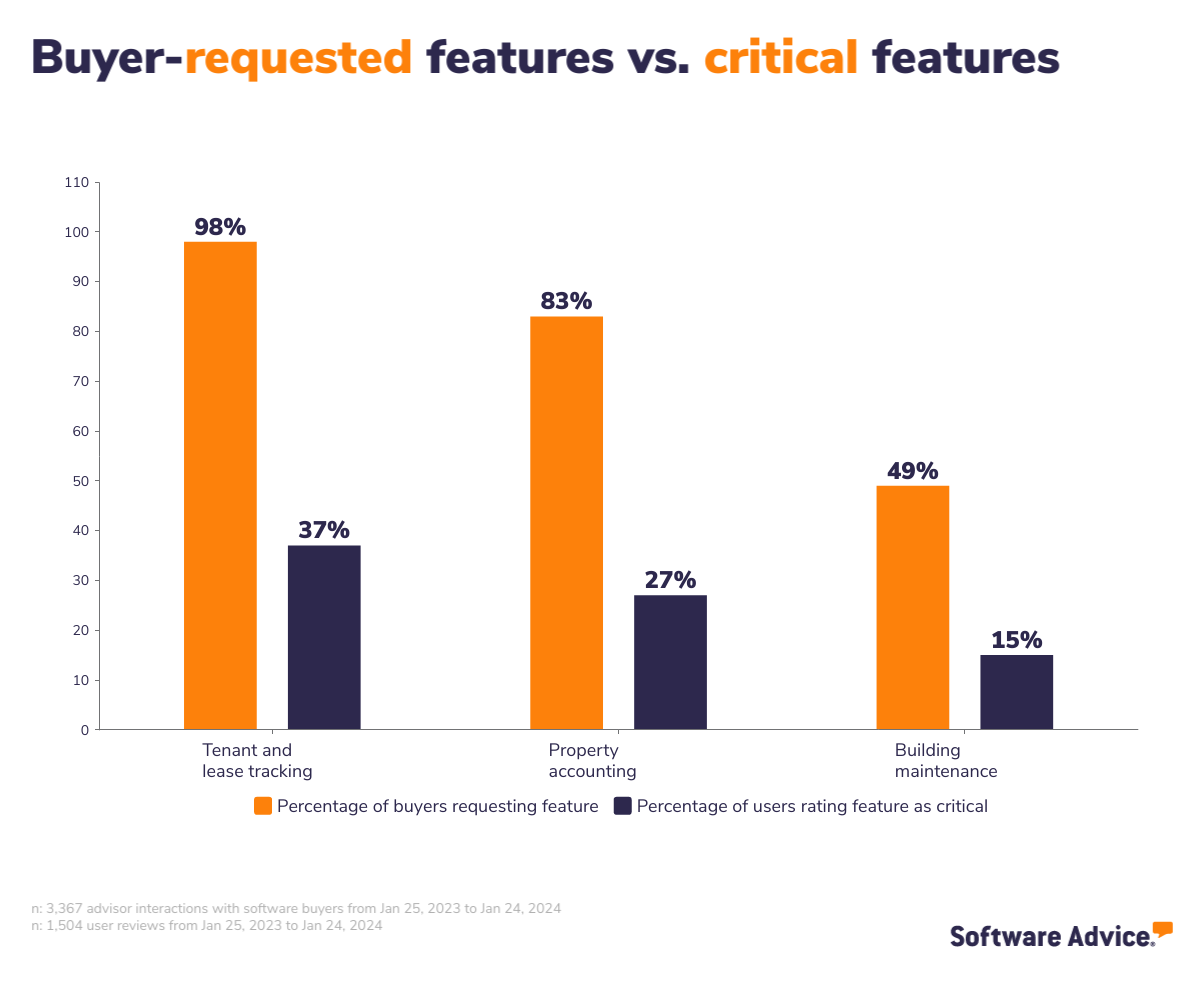
Pro tip
Consider your property size and complexity before investing in a property management tool. For single-family homes, look for a tool with basic features, such as online rent collection, tenant communication, and maintenance management. For large multi-unit properties, consider advanced features, such as community event management, lease expiration tracking, vendor management, and reporting.
Most businesses either rely on third-party software and manual methods for their property management practices or do not have any system at all
When our advisors asked buyers what methods they were currently using to handle their day-to-day property management operations, here's what they found:
Forty-nine percent of buyers use third-party software such as accounting and mobile payment services to automate their workflows.
While 24% of buyers do not have any system in place, around 23% rely on manual methods, such as spreadsheets for their property management practices.
Compared to all these, a dedicated property management software solution offers better functionality. It automates several tasks such as rent collection, tenant screening, maintenance requests, and lease management, reducing the need for paperwork and manual intervention. Property management software also includes collaboration tools, such as instant messaging, tenant portals, and document sharing to enhance communication between landlords and tenants.
Another benefit of dedicated property management software is that it eliminates the need for multiple third-party solutions to manage your property operations.
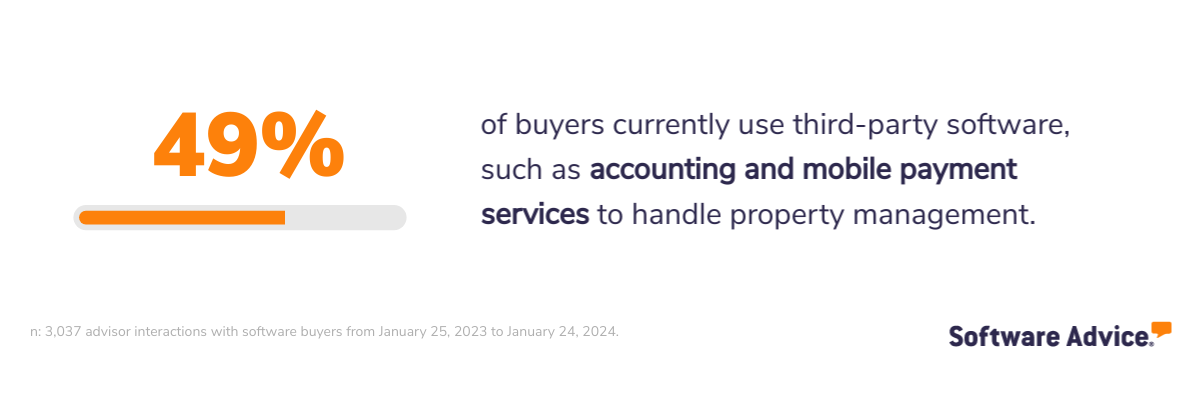
Pro tip
Consider a property management solution with flexible payment options, such as credit cards, e-wallets, and automated clearing house (ACH) transfers to cater to diverse tenant preferences and ensure a smooth payment experience. Also look for features, such as fraud detection, encryption, and compliance with Payment Card Industry Data Security Standard (PCI DSS) to safeguard financial data.
Inefficiency, limited functionality, and new business opportunities are key drivers of a switch to property management software
Our advisors conversed with buyers currently using either manual methods or third-party software and seeking a switch to property management software. These discussions shed light on businesses' real-life challenges with their existing tools. These included inefficiency (43%), limited functionality (26%), and new business opportunities (9%).
Inefficiency: Handling paperwork, collecting rent payments, coordinating maintenance requests, and managing tenant communication manually can be time-consuming and prone to errors. As the number of properties increases, handling these tasks can become even more challenging, especially with the involvement of multiple properties, tenants, and leases. A dedicated property management tool can automate these repetitive tasks for property managers, reducing the likelihood of errors while ensuring that critical tasks are completed on time.
Limited functionality: Manual methods often rely on traditional communication channels, such as phone calls and in-person meetings to communicate with property staff, tenants, and property owners. Moreover, these methods typically involve storing information in physical files or spreadsheets, which restricts access to critical information, such as lease agreements and maintenance records. Property management software offers advanced communication channels, including online portals and instant notifications to aid communication and centralized databases with searchable information for quick access to records.
New business opportunities: Several real estate businesses switch to new software to handle larger portfolios and pursue new business opportunities without being overwhelmed by routine administrative tasks. Property management software is designed to scale with the growth of a property business and accommodate increased units and workload without sacrificing operational efficiency. It allows property managers to operate more efficiently and provide better client services amid changing market conditions.
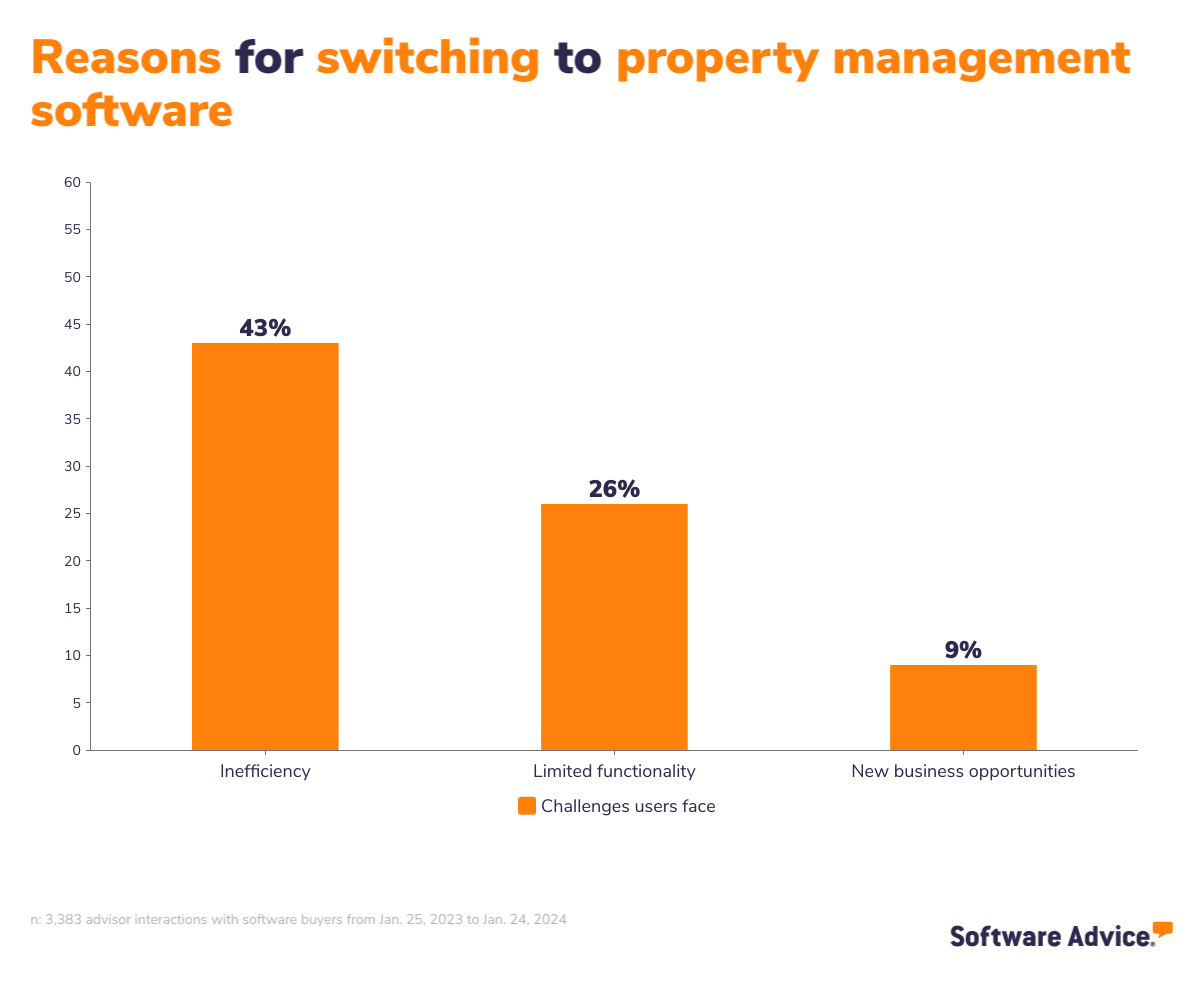
Pro tip
Shortlist a property management solution that can grow with your business and accommodate increasing volume of properties, tenants, and transactions. Additionally, ensure that the tool offers flexible pricing plans that adapt to your growing property size without any significant upfront costs and infrastructure investments.
The average buyer’s budget ranges from $39 to $94 per user, per month
The budget for purchasing property management software varies from industry to industry based on factors such as project size, complexity, customization level, and the required functionality.
However, the average budget across industries for purchasing property management software was approximately $69 per user per month.
The chart below highlights the average buyer budget per user, per month for the top five industries interested in property management software.
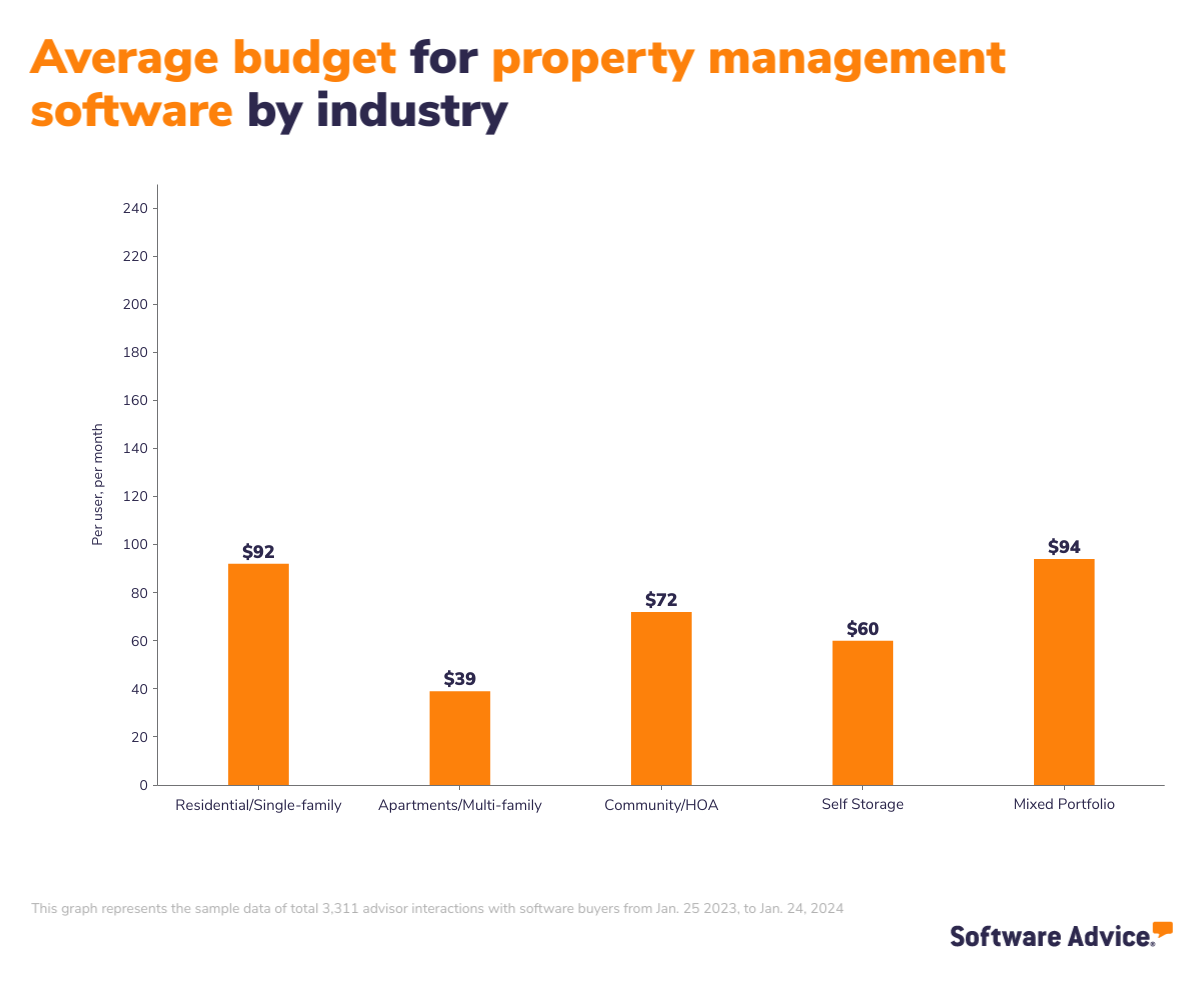
The average budget for each industry slightly differs from the overall average due to industry-specific requirements.
Businesses handling residential apartments for single families need property management solutions to manage routine tasks, including rent collection, maintenance requests, and income and expense tracking. They usually have basic feature requirements, such as online rent collection, work order management, maintenance reminders, and communication tools.
Real estate businesses looking after multi-family residential apartments need a property management tool for handling complex rent calculations, multiple lease terms, and prompt maintenance management, alongside basic requirements. Therefore, they often need advanced features, such as bulk communication tools, common area maintenance tracking, community event management, and resident portals in property management software.
More resources for your software search
Whether you’re looking to buy new property management software or replace your existing tool, here are some additional resources to aid your software search:
Start with our interactive property management software directory to compare hundreds of products, filter your search by specific features, and read comprehensive reviews from SMB leaders.
Check out top-rated property management software based on user ratings and popularity in the 2023 Property Management Frontrunners Report.
Review the property management software buyers guide to better understand the property management software market.
Buyer demographics
The buyers we interacted with are largely small businesses. You’ll find the demographics of the buyers below, so you can see the sizes and types of businesses, from annual revenue to industry.
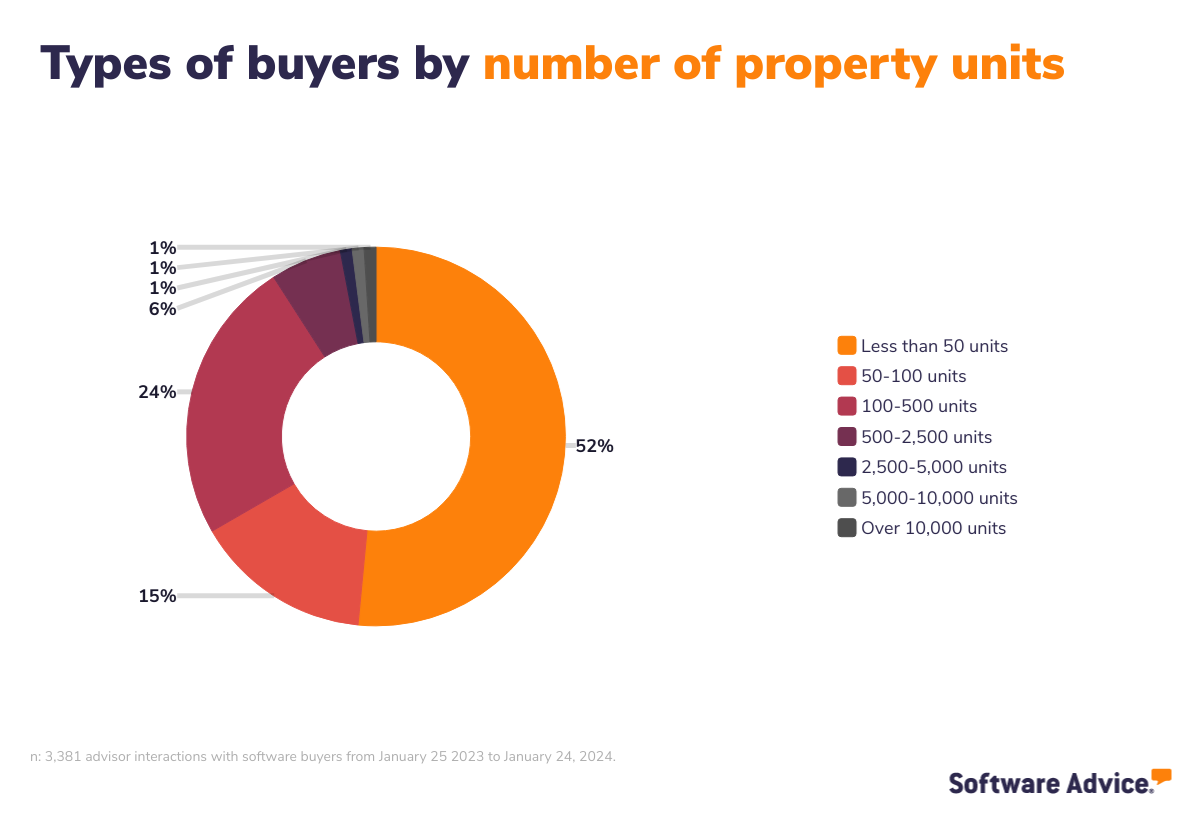
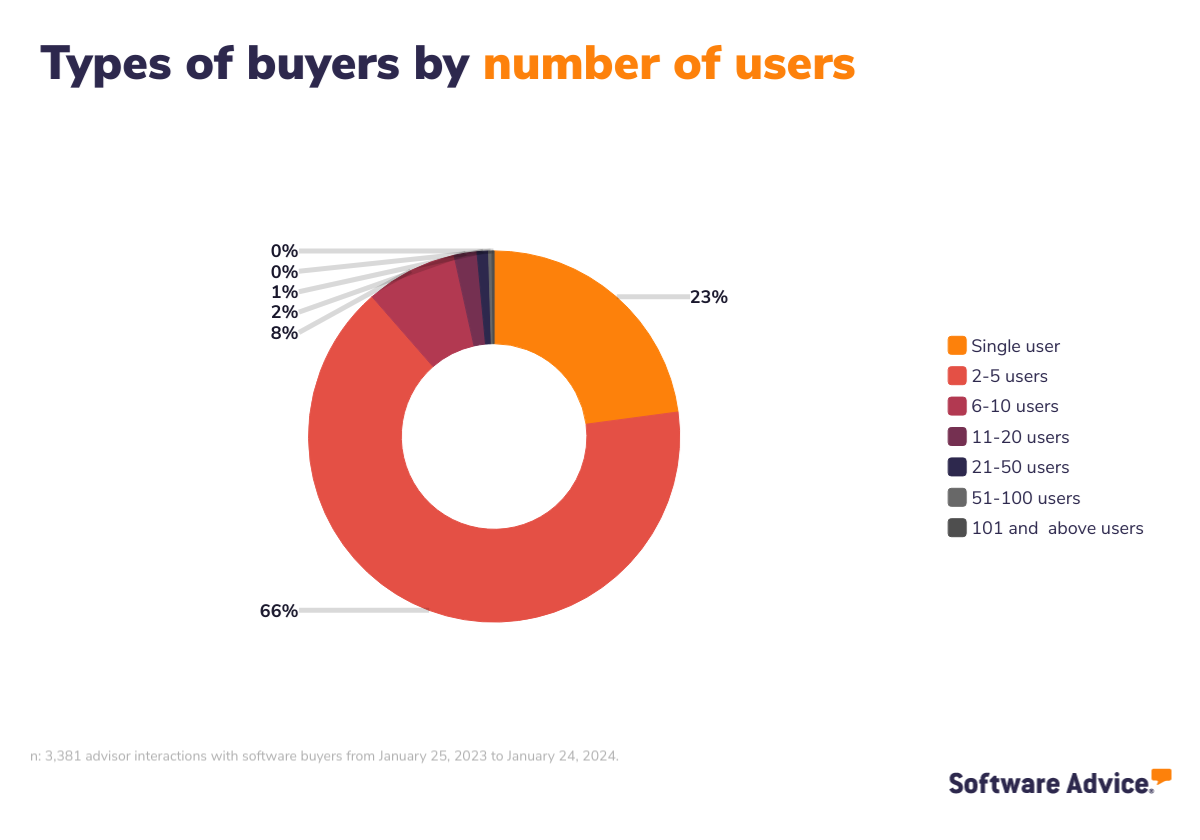
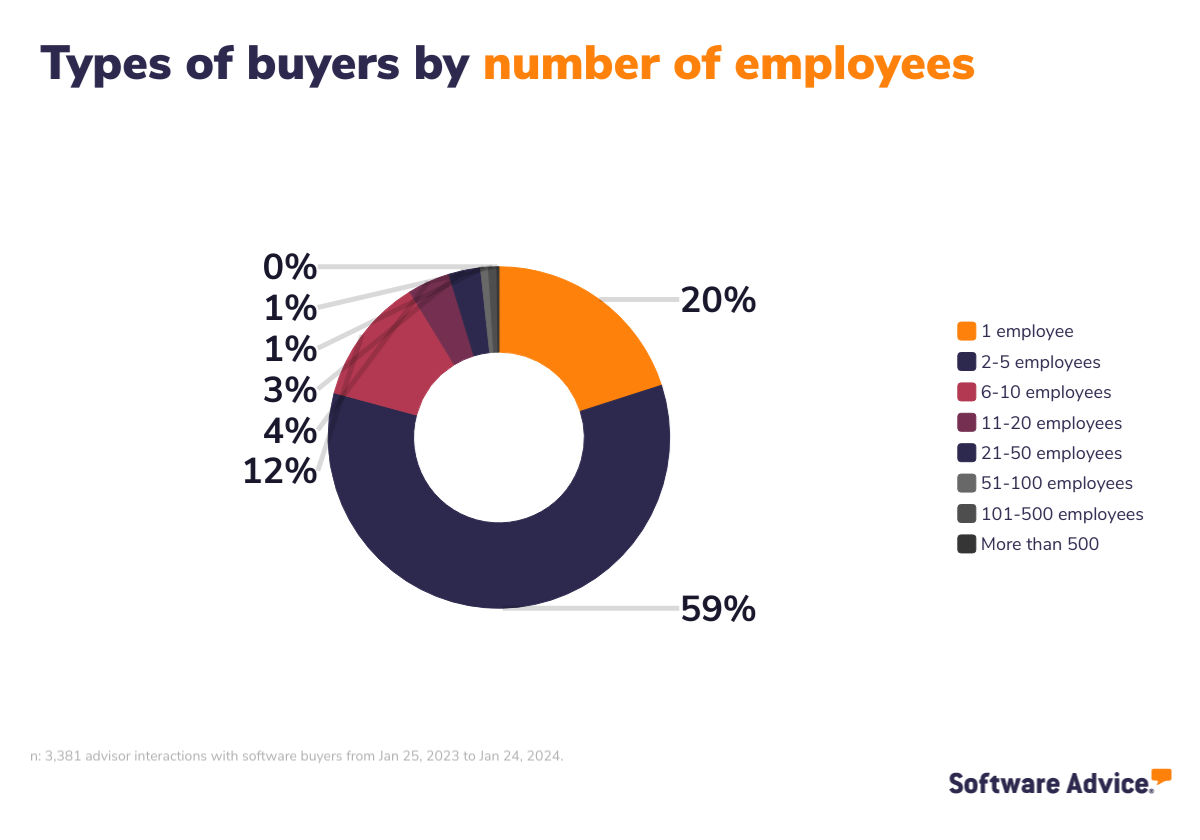
Methodology
Software buyers analysis methodology
Findings are based on data from conversations that Software Advice’s advisor team has daily with software buyers seeking guidance on purchase decisions. The data used to create this report is based on interactions with small-to-midsize businesses seeking property management tools. For this report, we analyzed approximately 3,300+ phone interactions from January 25, 2023, to January 24, 2024.
The findings of this report represent buyers who contacted Software Advice and may not be indicative of the market as a whole. Data points are rounded to the nearest whole number.